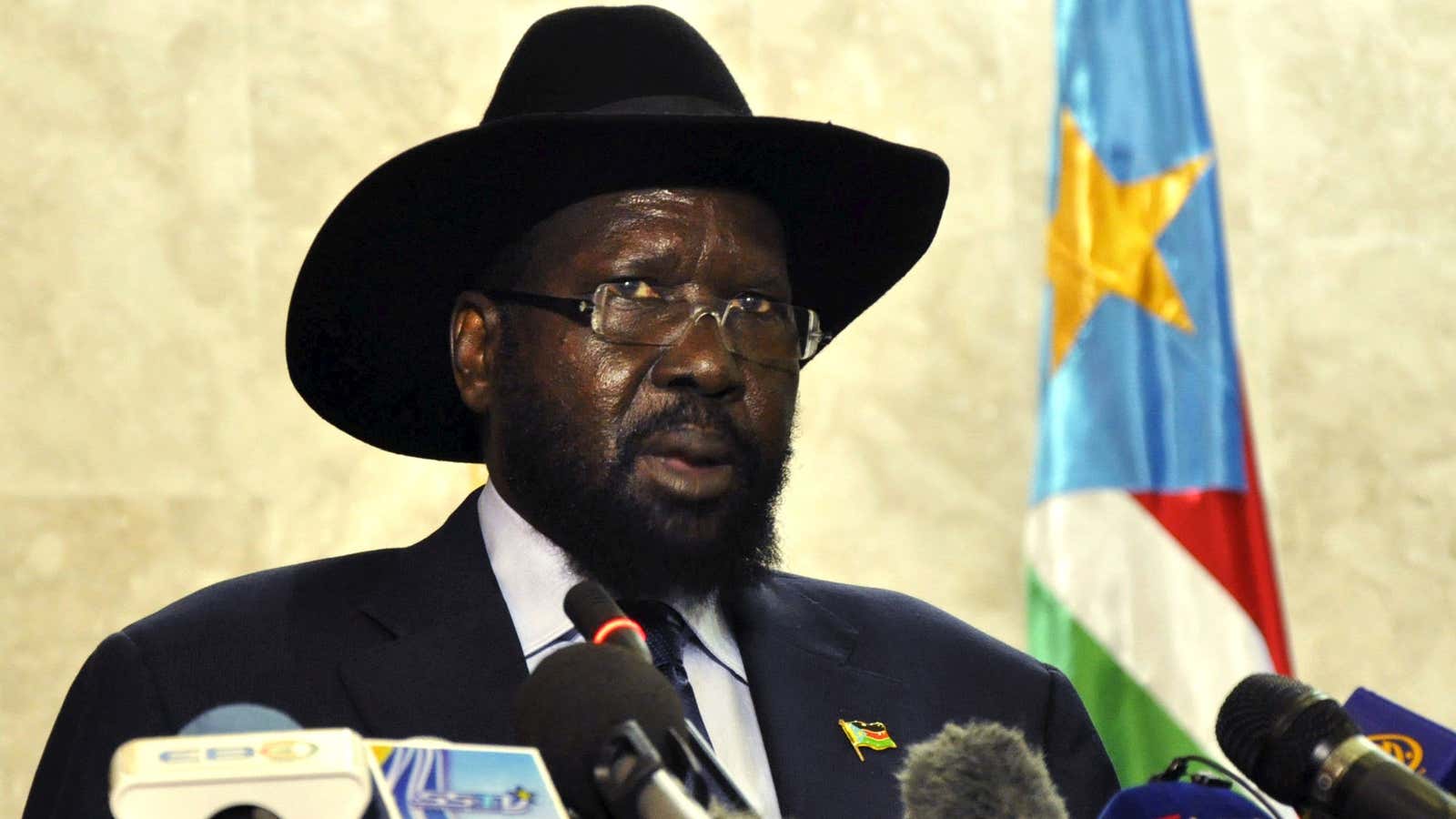Juba, South Sudan
Already backed by white supremacists, Donald Trump appeared to have garnered another unsavory endorsement this week when South Sudan’s president Salva Kiir, who the UN accuses of war crimes, was reported to have thrown his his weight behind the US Republican frontrunner.
But Kiir’s government, which has been accused of torture, sexual violence, extrajudicial killings and the recruitment of child soldiers, was very quick to immediately dispel any notion it had done such a thing. South Sudan’s foreign ministry confirmed to Quartz: “There is no truth to [the story] whatsoever.”
Too late.
Kiir’s reputation is such that many Africa watchers and journalists found the story plausible. Published in the well-read Sudan Tribune, it claimed the South Sudan leader would back a US presidential candidate who has spoken in favor of torture against the United States’ enemies.
But as it turns out, Sudan Tribune—whose coverage often rankles South Sudan’s government—had fallen for and reprinted text from feisty South Sudanese satire website Saakam, tagline: “News Like It’s Never Happened.”
Traditionally, newspaper cartoons have been the avenue for satire in African politics, but in South Sudan, where the few independent broadsheets have limited reach, Saakam is emerging as a main vehicle for pillorying those in power. Sudan Tribune is not the first African newspaper to republish satire as news. In January, a Kenyan paper published a satirical piece about Eritrea forcing men to marry more than one wife which went viral around the world.
The Trump story was written by a group of South Sudanese at home and abroad, Saakam, which translates in local Arabic to “what time is it?”, has gained a reputation for stories skewering the country’s endemic corruption, paranoid leaders, and trigger-happy soldiers.
With a sharp attention to detail—the Trump story nailed Trump’s syntax as well as the offbeat grammar typical of presidential press release here—Sakaam is also earning notoriety for tricking readers, despite disclaimers sometimes placed within the articles themselves.
Previous stories have fooled celebrities such as South Sudanese rapper Emmanuel Jal, and last week a leading South Sudanese civil society activist frantically emailed media houses trying to verify a Saakam story which described a secret, and bogus, government deal to appoint foreigners to the country’s cabinet.
But the site isn’t only about getting duped, or “Saakam’d,” as some South Sudanese now say.
“Saakam is meant to want people to wake up and ask questions,” which is increasingly dangerous in wartime South Sudan, one Saakam writer, speaking anonymously for protection, told Quartz.
Last year, seven journalists were killed in South Sudan, including one shot twice in the back after President Kiir threatened to assassinate reporters. Newspapers and radio programs have been shut down by Kiir’s National Security agents. Journalists have been abducted and tortured, while others languish in jail.
Though Saakam’s news is fake, the writer said they hope that by sparking discussion among South Sudanese, their satire can lead people to find truth rather than propaganda despite the harsh climate for press.
Saakam’s sometimes absurd stories also bring levity to this divided country, where tens of thousands have been killed in two years of civil war that has included ethnic massacres and mass rape.
“Comedy and laughter are like punctuation marks in a run-on sentence of never-ending sadness and tears,” the writer said. [We do this because] our other alternative would be to do what others do: take sides and spread the hate.”
